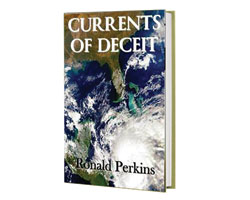An Eco Mystery on the Water

Is it possible to bring a little adventure and romance to the decidedly unsexy world of fish inspection? It’s given a go in Currents of Deceit by Ronald Perkins, a self-published book that falls into the category of “eco mystery.” Meet Scott, a hunky inspector with the Florida Fisheries Commission living in Key West and his girlfriend, Linda, a marine biochemist with a second degree black belt in Taekwondo. Environmental science is not-so-subtly slipped into the tale via conversations about topics like persistent organic pollutants and bioaccumulation that sound like characters are reading from a textbook. But these lessons lead them to a mystery—specifically, why are the fish samples full of PCBs?
Whether or not we believe that Linda would say things like “The problem is that PCB mixtures are relatively insoluble in water and don’t degrade at temperatures found in the ocean or at the earth’s surface,” during a car ride, readers will be sure to get quickly up to speed on the science behind these toxic chemicals.
Perkins—a longtime professor at Duke who previously worked with Shell Oil Company researching marine sediments in Coral Gables, Florida—runs into difficulties typical of authors writing in eco genres. Whether it’s kids’ books about recycling or wildlife or novels of the grown-up variety, many struggle with how to incorporate the science without resorting to long, technical explanations that detract from the story. Carl Hiassen, another Florida-based author, has mastered the form, weaving political scandal, outrageous characters, bizarre escapades and real estate swindles into stories that deal with Florida land-grabbing and overdevelopment without getting bogged down. Hiassen’s tactic seems to be to go big—fill the tales with so much absurdity and entertainment that saving the Everglades/weasels/dolphins is just part of the adventure.
The tale veers into the saga of an alcoholic professor who takes a couple students to the Conch islands and a New Orleans-based petrochemical company that’s under scrutiny for its pollution. The two worlds collide in the form of an oil storage facility that’s been put into the marine sanctuary, the toxins from which Scott and Linda have inadvertently discovered. The story is certain to shed some light on the field work of marine biologists, and with events like the BP oil disaster in the not-so-distant past, the cover-ups and collusions don’t seem so far-fetched.

